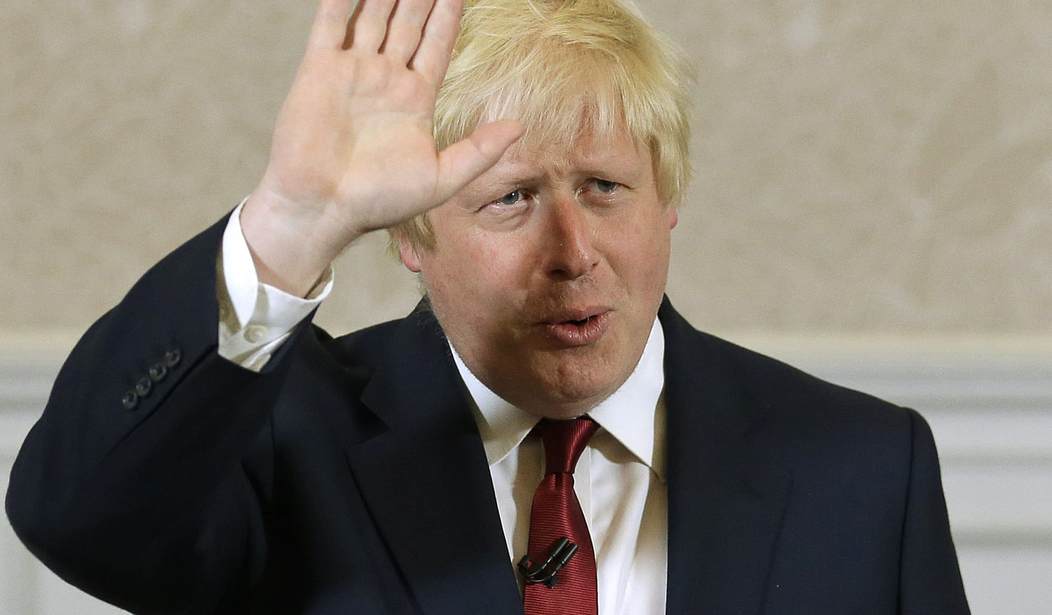I was privileged to have been in London last week when a home-grown emancipation proclamation was sounded all across the kingdom in the form of a referendum on “Brexit,” on whether Britain should leave the European union. The polls opened last Thursday, just a week ago, but the decision was not clear until the wee hours of Friday morning. I received the first text conveying the glad tidings at about 4:30 a.m.
I say “glad tidings,” but as all the world knows now, not everyone believed the tidings were glad. David Cameron, the British Prime Minister, did not think they were glad, as he made clear that morning when he announced his resignation.
Various large banks and other corporate entities were not glad, since their habits of doing business were inured to the sclerotic European model of regulatory overkill.
The commissioners of the European Union, beginning with the gray-on-gray Jean-Claude “Dr. No” Juncker, the President, were not glad, since the vote threatened to disrupt their cozy perquisites and tax-free life styles.
What was at first a little more difficult to understand was the fact that elite opinion across the country was not glad: lawyers, accountants, editors, teachers, businessmen: I spoke to a wide swathe of professionals and was stunned at the unanimity of opinion.
What made it difficult to understand was that the opinion crossed party lines. Tories, at least Tories of a certain stripe, were every bit as unhappy as their Labour compatriots. And that unanimity had reproduced itself in the Untied States: many if not most Republicans one encountered in New York were just as unhappy with Brexit as were their Democratic counterparts.
Elite opinion is a wonderful solvent. It dissolves many barriers, not to say principles. It fosters a wondrous Us-vs.-Them unanimity. It shows us that not all traditional habits are dead. Snobbery, for example, is just as powerful circa 2016 anno Domini as it was in the eighteenth century.
Last Wednesday, everyone — almost to a man — assured me that Brexit was not going to happen. The vote might be close — you know how unscrupulous these populist politicians were at appealing to the angry and disaffected masses. But in the end sanity would prevail. The polls said so. Finally we could this nonsense behind us.
The music had changed by Friday morning. As I noted, the mood moved quickly from denial to anger.
There’s still plenty of anger around, but everywhere you can see people beginning to move on to the next stages of grief: bargaining, depression, and acceptance.
The Brexit really was an historic event, and I was glad to be in London to chronicle the run up — will there, I wondered, Always Be an England? — and then the event itself and the first several days of aftermath (and for good measure here and here).
Now that I am back in the States, I find several questions about the Brexit vote remain.
Was Brexit a media ploy to raise rating?
Not at first. But one could be forgiven for thinking so in the aftermath.
The feeding frenzy was extraordinary, as was the extremity of the rhetoric. Consider, to take just one egregious example, Tina Brown’s scurrilous attack on Boris Johnson, the former Mayor of London who was a leader of the Brexit campaign (and, until earlier today, the odds-on favorite to be the next Tory leader). “Beware Boris Johnson,” her headline scraemed, “The Power of a Cunning Clown.” Tina Brown reaches back to his student days to slime Boris as a “sneaky,” dishonest, representative of a “peculiarly dangerous British type,” the “Gentleman Hack,” who is as “hostile to facts” as he is hypocritical. As Queen Gertrude put it in another context, the lady protests too much, methinks.
But Tina Brown’s hysterical exhibition is just par for the course. Doubtless she thinks it drives traffic to her gossip site, though Boris’s surprise withdrawal from the leadership bid this morning makes it all seem faintly ridiculous.
Not all the media efforts to capitalize on the Brexit votes were exercises in character assassination. There were also various melodramatic arias dilating on the theme of imminent catastrophe. Perhaps the most emetic of these was Simon Tilford‘s inadvertently comical essay for the “Centre for European Reform” (which might have been called “The Committee of Public Safety“) “Dear EU Leaders, Please Handle Britain With Care.” “This is not an easy time to be British, or rather English,” Mr. Tilford began (cue the violins). “I cannot remember a period when the country was held in such contempt.” According to Mr. Tilford,
The derision being heaped on it is fully justified. The Brexit campaign encapsulated all the country’s negative sides: immodesty, surly resentment of foreigners, a preference for style over substance and rose-tinted sentimentality about the past. We are currently hard to like. Schadenfreude at Britain’s difficulties is understandable.
Etc., etc.
What was Brexit really about?
British sovereignty. Whatever arrangements the Brits finally decide to make about immigration, bananas, tea kettles, or other items that affect their lives, the Brexit vote was a reaffirmation that the decision should be taken by the British people through their duly elected representatives in Parliament, not unelected and unaccountable officials from Brussels.
So what will happen?
The EU, which means Germany, will make whatever concessions it needs to continue to have unrestricted access to the British market. Britain is the world’s fifth largest economy and is one of the world’s largest trading nations. Already its market has recovered and the drop in the pound will have the effect of making its goods more competitive. As the geopolitical strategist George Friedman noted yesterday, the world is wrong to think that the emancipation proclamation that was Brexit isolates Britain. The country that is most affected is not Britain but Germany, for which the maintenance of the European free trade zone is “an existential issue.”
The bottom line?
There will be some political turmoil in England as disgraced Labor leader Jeremy Corbyn tries to staunch defections from his team and the Tories endeavor to sort out their leadership bid.
I suspect there is a back story to Boris Johnson’s surprise withdrawal from the Tory leadership contest this morning. At the moment, to two most likely candidates are the Remainer Theresa May, the Home Secretary, and Michael Gove, the Lord Chancellor, along with Boris Johnson and Dan Hannan, one of the chief architects of Brexit.
A week is a long time in politics, Harold Wilson is said to have remarked. A week ago, everybody who was anybody thought that the Remain vote would prevail. A few days ago I was assured by a Tory MP (one who was a passionate Remainer) that the next Tory leader would almost certainly be Boris Johnson and if not him then “it had to be a Leaver.”
My own sense on Tuesday was that Boris Johnson, Michael Gove, and — seconded from the camp of David Cameron — George Osborne would be the Tory troika that would steam to success in the next general election. My sources now tell me Gove’s sudden defection — “Boris cannot provide the leadership or build the team for the task ahead,” he said earlier today — has infuriated MPs who supported Boris. So who knows? Right now, the smart money is favoring Theresa May. But a look at what happened last week should remind us of exactly how stupid the smart money often is.









Join the conversation as a VIP Member